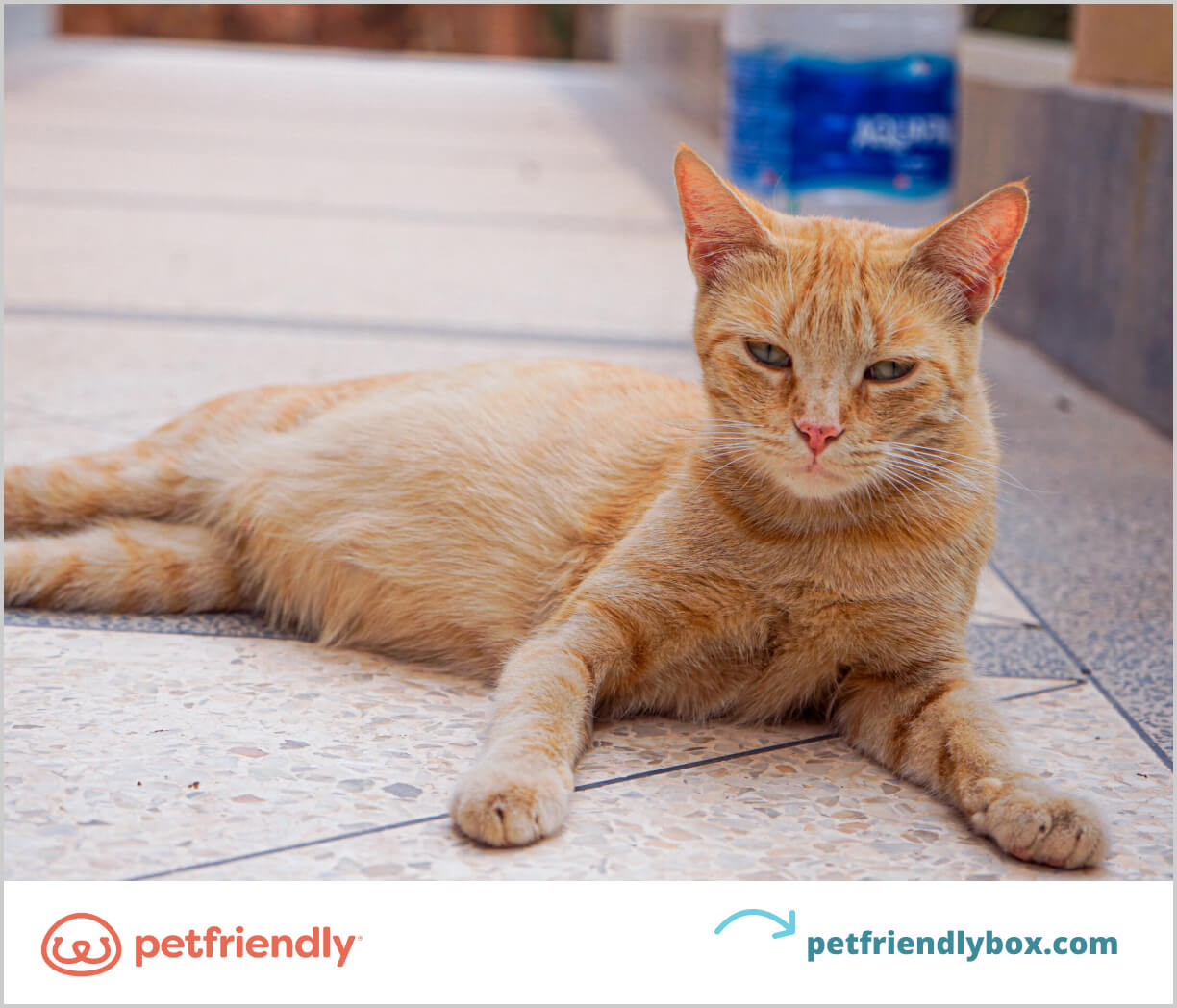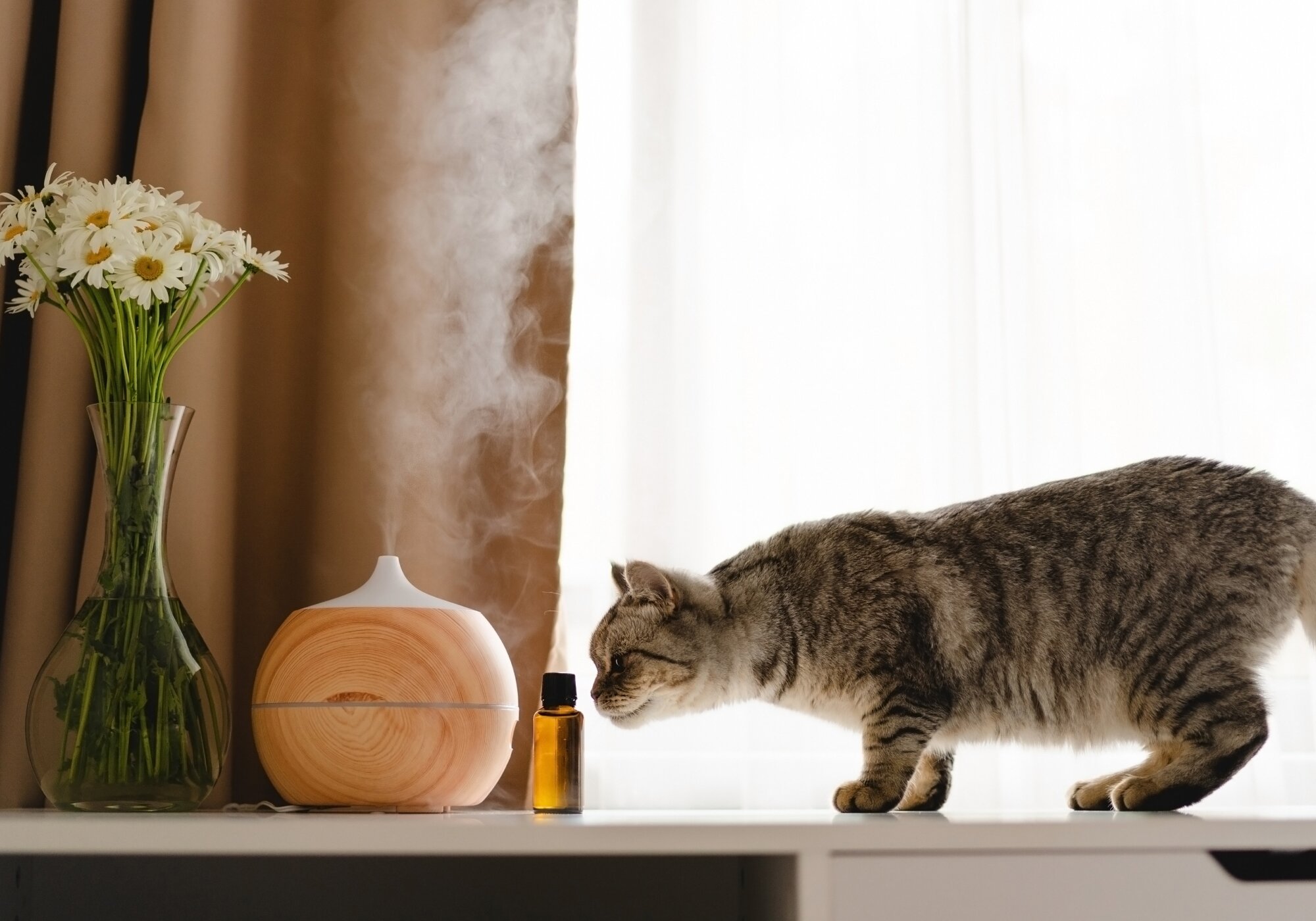How do you make your home cozy and safe? Locking doors, filling your home with your favorite scents, and communicating safety plans are some ways humans feel more comfortable in their homes.
Cats also have a way of communicating if they feel safe in their space — with pheromones. But what are pheromones, and how do cat pheromones work?
Keep reading to learn:
- What are feline pheromones
- How they work
- The benefits of cat pheromones
- Types of pheromones
- Ways to use them
What are feline pheromones

Pheromones are colorless chemical signals that are species-specific and do not have a smell. Cat pheromones are what cats use to communicate and feel comfortable.
Cat pheromones are a type of chemical communication between cats. This communication can be centered around health problems, mating, or territory marking. Other pets also react to and communicate through pheromones.
How cat pheromones work

A cat's olfactory system detects pheromones through licking, sniffing, or breathing. After a cat sniffs out a pheromone, the action of licking brings the molecules to their vomeronasal organ (VNO). Their VNO is on the roof of their mouth.
Cats experience a flehmen response when stimulated by pheromones. A flehmen response causes a cat's mouth to open, and a behavioral or psychological response to occur like calmness or happiness.
Types of cat pheromones
There are several types of pheromones for cats. Each type has different benefits and effects that range from maternal bonding to behavior modification.
Here are some common types of pheromones for cats.
Natural pheromones
Natural cat pheromones are pheromones that are released by cats to send messages. Natural pheromones can communicate messages between cats like:
- Expressions of fear or stress
- Territorial responses
- Sexual status
Cat-appeasing pheromones
Also called “mother cat's” pheromones, the feline-appeasing pheromone helps kittens feel happy and safe. They also help a mother cat identify her kittens.
Feline-appeasing pheromones are used by nursing mothers to please newborn kittens. They also can help reduce tension and feline aggression in newborn cats. Overall, the cat-appealing pheromone helps a mama cat bond with her babies.
All female cats produce the feline-appeasing pheromone. These pheromones can release into the environment or onto other cats through:
- Facial rubbing
- Tail wrapping
- Urine spraying
- Scratching
Feline facial pheromones
Have you ever wondered why cats rub their heads on furniture and floors? This is an example of feline facial pheromones at work.
The feline facial pheromone is left behind when a cat rubs their head on a surface. These pheromone markers claim a cat's territory.
Feline facial pheromones also help cats feel safe and at home in a space. When a cat recognizes their feline facial pheromone, they know they are in a safe space.
Synthetic pheromones
Synthetic pheromones are artificial pheromones that mimic calming, facial, and natural pheromones. Humans cannot sniff out synthetic pheromones. But, they can be sniffed out by cats.
Calming pheromones
Calming pheromones can be used in the form of diffusers, sprays, and collars in your home. These calming pheromone products use synthetic pheromones to keep your cat calm.
Calming pheromones help cats relax in stressful situations and new environments. The calming effect of these pheromones make calming pheromones popular among pet parents.
Benefits of cat pheromones

Pheromones are a natural way for cats to communicate with other cats. Aside from communicating with other cats, there are other benefits to cat pheromone therapy.
1. Pheromones curb unwanted behaviors.
Stressful changes to your cat's environment like moving to a new home, traveling, or adding a new cat to your family can lead to behavior problems. Pheromones help with managing feline problem behaviors like urine marking, scratching, and excessive meowing.
2. Pheromones promote bonding.
Pheromones have a calming and happy effect on cats. When your cat is happy and calm, they are more open to play time, snuggles, and being around people.
3. Pheromones keep your cat calm.
When your cat detects pheromones in an environment, it helps them feel comfortable and calm. A calmer cat means less anxious behaviors, aggression, and stress.
It may take a few days to notice the effects of calming pheromones, so be sure to try other calming techniques as well. Not sure where to start? Check out our expert guide to cat enrichment.
Cat pheromone products

If you have domestic cats at home, you can try using synthetic pheromones to keep your cat calm. Here are some common products that can help calm your domestic cat.
Pheromone diffusers
Diffusers are a form of pheromone therapy that can help prevent anxious behaviors in your home. A diffuser releases pheromones into your cat's environment and works to:
- Limit litter box aggression in multi-cat households
- Reduce separation anxiety
- Curb anxious behaviors like urine spraying, urine marking, and meowing
Not all pheromone diffusers are plug-in diffusers. In fact, some diffusers do not require any electricity at all. Diffusers are a great option to add to your home because they can be placed on a shelf and do not make any loud noises that could scare your cat.
Sprays
Using calming sprays can be helpful while on-the-go for vet visits, travel, and car rides to keep your cat calm. It can be helpful to use pheromone sprays on unfamiliar objects to help cats feel safe around them.
Sprays should not be used directly on your cat. Instead, spray on surfaces in new environments or on toys.
Essential oils
Pet parents can use essential oils to curb unwanted behaviors and calm down their cat. Most oils are in a dropper bottle, and drops can be placed in your cat’s food or water, on their fur, or on their pet bed.
Recommended products:
Collars
Calming collars can help reduce fears of loud noises, limit anxious behaviors, and stop excessive meowing in cats. Most collars last up to 30 days.
Recommended products:

Frequently asked questions
Check out some common questions from pet parents about pheromones for cats.
Are dog pheromones different from cat pheromones?
Dog pheromones are unique to dogs and help them communicate with other dogs. Some calming pheromones have similar effects on cats and dogs.
How long does it take for pheromones to work?
Pet parents typically see synthetic pheromone products like diffusers and sprays working a few days after application.
Why do cats rub their faces on furniture?
Cats mark their territory and release pheromones when they rub their face on furniture and other surfaces. The facial pheromone helps cats feel comfortable in a space.
Do male cats have pheromones?
Yes! Whether you have a domestic cat, a female cat, or a male cat, they all have pheromones they release naturally to communicate. But, only a female mother cat has the cat-appeasing pheromone.

